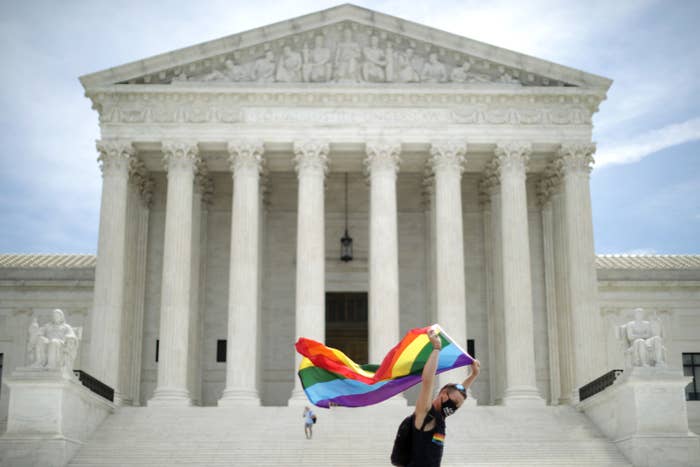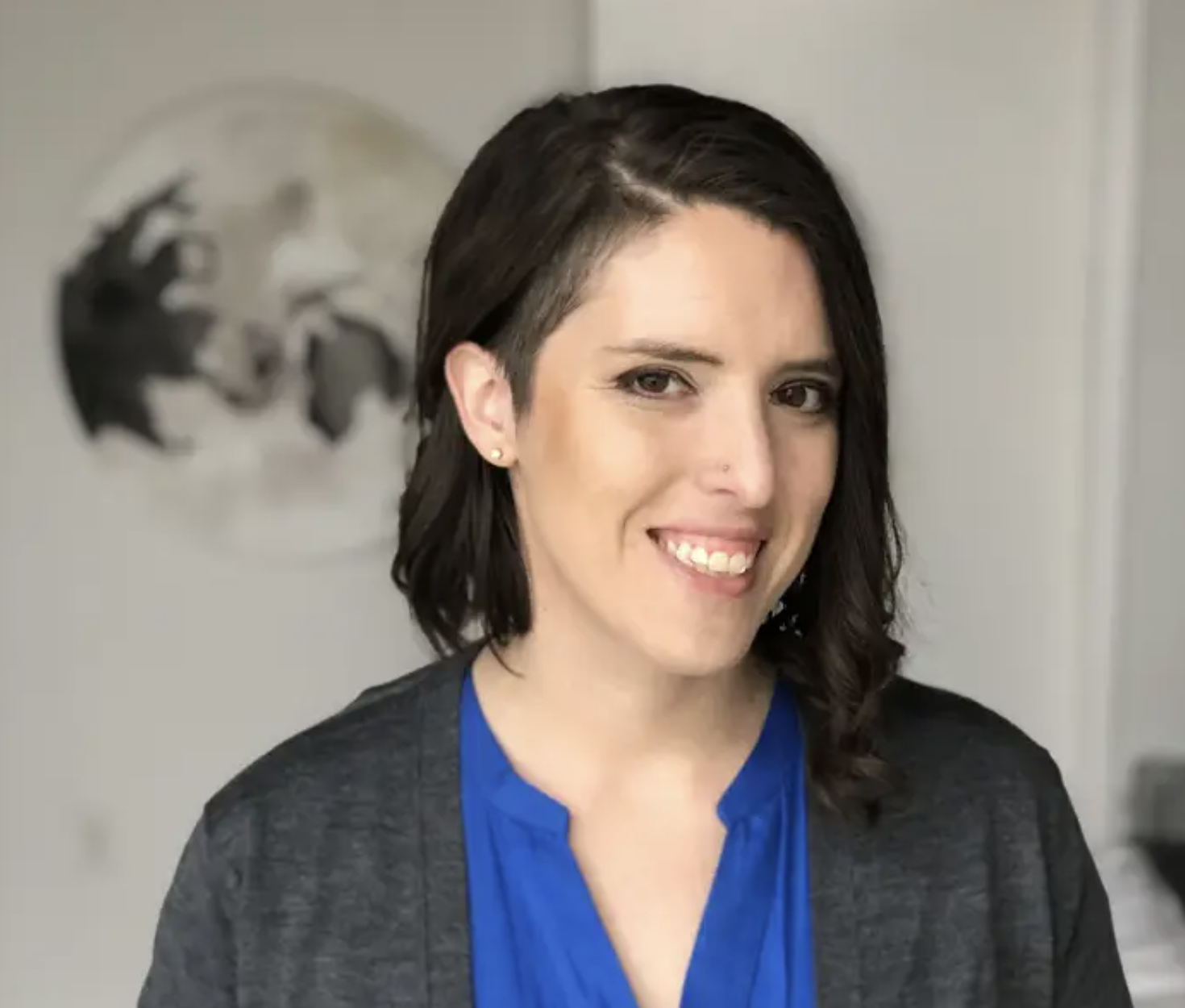
Rachel Mosby could barely sleep Sunday night.
She tossed and turned for hours, knowing it was possible that a court ruling could come out in the morning that could change not only her life, but the lives of so many people like her. She woke up, took a long shower to calm her nerves, and then checked her phone. It was blowing up with messages that all said the same thing: Across the United States, it was now illegal to discriminate against LGBTQ people in the workplace.
“I was just shaking uncontrollably and crying,” Mosby, 52, told BuzzFeed News. “I had to kind of pull myself together from that because it was just sheer joy.”
Monday’s Supreme Court decision marks one of the greatest civil rights victories in the history of the LGBTQ community. In a sweeping 6–3 vote, the top US court ruled that Title VII of the Civil Rights Act of 1964, a federal law prohibiting discrimination in the workplace based on "sex,” also applied to discrimination against LGBTQ people.
In an instant, the monumental decision secured worker rights for people like Mosby, a transgender woman in Georgia, who live in conservative states where such protections did not yet exist.
“I’ve got a queer kid as well, and she’s with me, and we were both having a great cry-fest,” Mosby said. “This is going to mean a lot, for my kid as well, and for the generations that come behind this.”
Mosby previously worked as the fire chief in Byron, Georgia, a position she held for over a decade. When she came out to her colleagues as transgender in 2018, she said she began experiencing workplace discrimination, including misgendering, being called anti-trans slurs, and being reprimanded for wearing a skirt, according to court filings.
In June 2019, she was fired. Officials blamed her dismissal on poor performance, but Mosby said she does not believe that’s the real reason. Just over a month ago, she filed a lawsuit against her city, alleging discrimination based on her gender identity.
Now, with discrimination against LGBTQ people being made illegal nationwide, Mosby said she feels newfound confidence that she will win her case. “It gave me an immediate sense of validation and put me on a little more sure footing for my outlook for the future, especially with my case going forward,” she said. “It makes me extremely optimistic now that we will win.”

Some 21 states already had legal protections against workplace discrimination based on sexual orientation and gender identity, according to an analysis last year from the think tank Movement Advancement Project, but Monday’s ruling has made it the law of the land. Prior to the decision, roughly half of the more than 8 million LGBTQ people in the US lived in states without explicit protections if they experienced discrimination at work.
In the wake of the decision, Raquel Willis — one of the founders of the Transgender Law Center's Black Trans Circles, a program aimed at empowering Black trans women in the South and Midwest — paid tribute on Twitter to one of the plaintiffs who died prior to Monday's decision and recalled once being afraid to come out in the workplace. "At my first job, I was stealth out of survival. I wasn't out as trans because I was afraid of being fired," Willis wrote. "Today's #SCOTUS ruling will encourage so many more folks to move beyond that fear. We honor you, Mrs. Aimee Stephens, for your fight. I know you're looking down on us."
Stacy Bailey, an elementary school art teacher in Texas, settled a discrimination lawsuit in February against her school district after it suspended her in 2017 for showing students a photo of her wife, Julie Vazquez. For Bailey, Monday’s ruling was a moment of both celebration and reflection. “My wife ran towards me, we hugged and jumped and she started crying,” said the 34-year-old teacher. “It was a very dramatic scene in the Bailey-Vazquez household.”
They immediately hung their rainbow Pride Flag outside their balcony. “It really brought me to my knees,” she said, “and to tears to think maybe people really aren’t going to have to deal with this much longer and maybe other gay teachers like me are not going to have to go through the trauma and the battle that I had to go through.”

Bailey donated $10,000 from her settlement payout to Resource Center's Youth First, a Dallas program for LGBTQ teens, but she lost her beloved job at an elementary school and now works at a local high school. “Unfortunately, I will feel the pain of what happened to me for the rest of my life,” Bailey said. “Nothing can undo what happened to me because of discrimination.”
“[The court’s decision] was just overwhelming for someone like me, whose life has been completely turned upside down and faced a lot of trauma because of discrimination in the workplace,” said Bailey.
Jasmine Beach-Ferrara, the executive director of the Campaign for Southern Equality, a group that fights for equal rights and protections for LGBTQ Southerners, told BuzzFeed News that a Supreme Court ruling, rather than state-by-state laws, creates protections for LGBTQ workers “in a universal way, rather than a patchwork sort of blanket that we’ve been dealing with.”
“The South is home to more than 5 million LGBT folks, and most people have lacked the basic protections around workplace discrimination,” Beach-Ferrara said. “It’s a tremendous and historic day, and another significant step forward in the journey to ultimately full equality under the law for LGBTQ people.”
Beach-Ferrara said that as recently as this past weekend, she’d received an email from someone experiencing this form of workplace discrimination. “[This decision] means that people will be protected from being fired because of who they are or who they love,” she said. “What this ruling means is that in every single town, in every state across the South, people will now have those protections in place.”
But Bailey, the Texas teacher, warned against assuming that people’s opinions will change as easily. She called on school districts, states, and governments to continue to push for antidiscrimination policies that line up with the Supreme Court ruling. “I do want people like me to be very aware that just because a federal ruling has passed,” said Bailey, “it does not erase the decades of prejudice that surround us, especially in Texas, especially in rural or small communities.”
Cierra, a 23-year-old bisexual woman in Missouri, told BuzzFeed News she was subjected to numerous anti-gay comments in her former workplace, an ice rink in St. Louis. (Cierra asked that her last name not be used because she is not currently out to her whole family.)
“This decision that came out today is so important because, while I don’t always tell the people I work with my sexual identity, I have been in a room with my former boss and he made homophobic statements but I was too scared to say anything,” she said. “I just remember feeling like, when my shift was over, I just wanted to get out of this situation and not have him know that this made me feel uncomfortable.”
With Monday’s SCOTUS ruling, Cierra said she feels a sense of relief that she does not ever have to put up with such treatment. “If another employee or boss makes a comment,” she said, “I can take a stand [and] calmly inform them, but know that I can come back to work the next day and not lose my paycheck.”
“I think the most important thing to get across now is that we, in the community, have a little more freedom than yesterday,” Cierra said. “And while we still don’t have the same rights as a straight person, life is a little better today.”
Bailey agreed, comparing the historic decision to the joy she felt in marriage equality becoming law, which she said allowed her to say the word “wife” in any public situation.
“That word came with power and respect and dignity, and this ruling does something similar to us,” she said. “We’re going to be able to walk into our workplace with our head up. We are allowed to be ourselves.”

